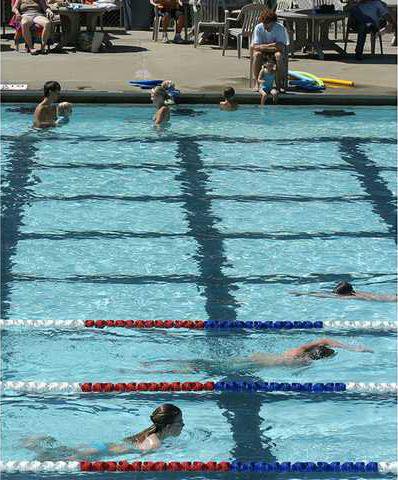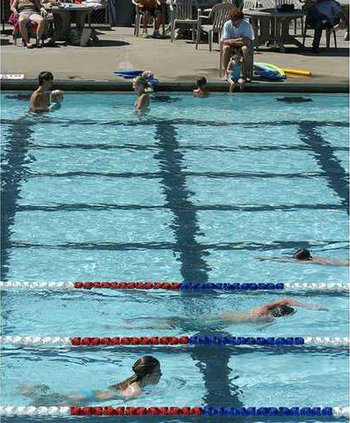For many people, a summer without swimming pools is unthinkable. But it may come to that, if Georgia's extreme drought does not abate. Under the Level 4 drought restrictions currently in place in 61 North Georgia counties, outdoor swimming pools cannot be filled or "topped off" with municipal water.
Kevin Chambers, spokesman for the Georgia Environmental Protection Division, said EPD director Carol Couch has the authority to exempt all swimming pools from the ban. But he hopes that's a decision that won't need to be made, if Georgia starts getting normal rainfall. "It's premature to speculate on what spring is going to bring," Chambers said.
But Jimmy Gisi, executive director of the Georgia Recreation and Park Association, said managers of community pools need to be able to plan ahead. "We are in conversations with the EPD about this," he said. "We need a decision soon, because we're getting to the time of year when you have to start advertising for lifeguards for your summer programs."
Melvin Cooper, director of Gainesville Parks and Recreation, said he is proceeding under the assumption that he will be able to use the Green Street Pool this summer. "We're moving forward now with the hope that winter rains will ease the drought restrictions somewhat," he said.
Recreation managers aren't sure what to expect, because they've never been in this situation. When Level 4 drought restrictions were declared last year, the summer season was already over.
Cooper said water from last year is still in the Green Street Pool, protected by a cover. "Typically we drain and refill it just before opening (for the season)," he said. "If we are not able to fill the pool, it is possible to re-treat the existing water. But not being able to top it off is a concern."
Harold Skelton, owner of All Seasons Pools and Spas in Gainesville, said pools need to be cleaned through periodic "backwashing," but you need a certain amount of water in order to do that. "If the water level gets too low, there's no way to run it through the filters to clean it," he said.
Gisi said that is a critical requirement for public pools. "If you can't backwash and recirculate, you could never meet health regulations and you'd have to shut down," he said.
Gisi said the GRPA's 2,000 members represent 154 local governments and nonprofit organizations. They plan to seek an exemption from EPD for community pools, but not privately owned ones.
"We know we're not considered an essential government agency like the police and fire departments," he said. "But we contribute to the quality of life. Children need recreational activities to keep them out of trouble. And swimming is important for seniors who have conditions such as arthritis and cannot do weight-bearing exercise."
Because the EPD's drought restrictions apply only to outdoor water use, indoor pools are not affected and can continue to operate as usual. But there are only a few indoor pools in Hall County, including those at Riverside Military Academy and the new YMCA.
The city of Gainesville will have a large indoor pool at the Frances Meadows aquatic center, but Cooper said that project won't be ready to open until July at the earliest. And the planned outdoor "splash park" at the center would not be allowed to operate as long as Level 4 rules are in place.
However, commercial water parks, such as the one at Lake Lanier Islands, do not have to conform to the drought restrictions. "They're currently exempt, because their business is like a car wash; it's based entirely on water," said Chambers. "But that (rule) could change."
Homeowners with backyard pools are unlikely to be granted an exemption, because a private pool is considered a luxury and is not a source of income.
Gainesville Public Utilities is allowing customers to fill pools only for "structural integrity"; for example, if a pool has just been drained for repairs, and the walls will collapse if it isn't refilled with water. But in most cases, if someone wants to fill a pool, they would have to use well water or have water trucked in from somewhere that isn't affected by the drought.
"I'm sure people will be inconvenienced," said Gainesville Public Utilities director Kelly Randall. "But to tell the truth, it would be an extremely hard thing to police. You can't really tell by looking at a customer's water bill if they've been filling a pool."
Municipal water departments are facing an enormous challenge this summer if the drought doesn't improve. They're under a state mandate to limit water usage to the same amount used during the winter.
Prohibiting use of swimming pools could help cities meet that goal, but only slightly.
"Certainly the amount of water used in irrigation is far greater than what's used in swimming pools," Randall said. "But every piece of the pie is important, and you have to look at all sides of water conservation."
It is not known exactly how many pools - public, private and commercial - there are in Hall County. Peggy Pierce, spokeswoman for the Hall County building inspections office, said 121 permits for new pool installation were issued in 2007.
Skelton said the biggest pool in the county is probably the Olympic-size indoor pool at Riverside, which holds more than 100,000 gallons.
"But for backyard pools, the average for the built-in type is about 26,000 gallons, and the above-ground pools are typically 10,000 to 12,000 gallons," he said.
The prospect of perhaps hundreds of stagnant pools is raising some health concerns. "If you turn the pool (pump) off and don't cover the water, you're going to start getting algae blooms once the water warms up," Skelton said.
If most of the water evaporates, the remaining shallow puddles would become breeding grounds for mosquitoes. "We receive complaints even now about pools that are left unattended," said Pat Braswell, director of Hall County Environmental Health.
Her agency is responsible for controlling mosquito-borne diseases such as West Nile virus. "If we get a complaint, we try to contact the property owner and get him to drain and cover the pool," Braswell said.
She recommends that pool owners continue to keep their pools running as long as possible, and keep treating the water with chemicals to kill microorganisms. "The alternative is to put a cover over it, but that cover needs to be airtight (to keep mosquitoes out)," she said.
Chambers said the threat of disease will be one factor the EPD considers as it weighs the wisdom of allowing or banning swimming pools this summer.
"Public health and safety are the No. 1 priority in the state's drought response," EPD director Couch said in a prepared statement. "A decision on exemptions would be made only after consultation with health officials and with input from local governments and utilities."

